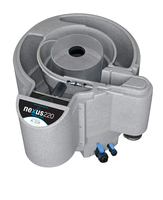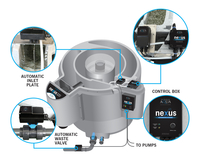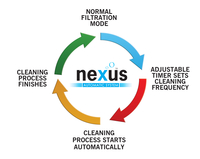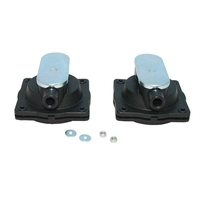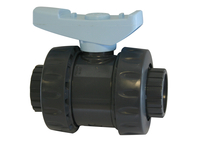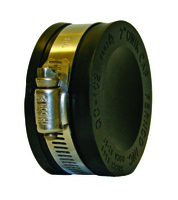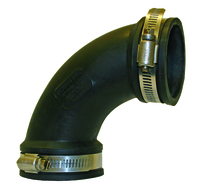Nexus220
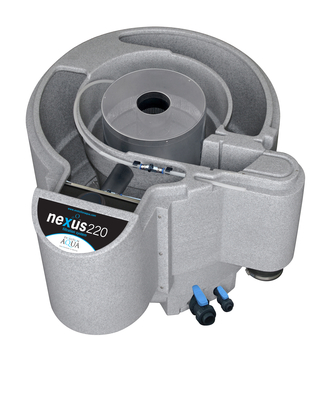
Description
Introducing the next generation of
Nexus Filtration Systems from Evolution Aqua.
The Nexus 320 and Nexus 220 filtration
systems deliver dramatically improved levels of clarity for ponds. Building on
the success of the award winning Nexus range this new generation of filters
cleverly combine mechanical and biological filtration into one advanced filter
system.
The Nexus 220 and 320 feature a re-designed
Eazy filter which utilises the all new K1 Micro Filter Media, in a static bed,
to deliver improved levels of mechanical filtration. The Nexus filter systems
also use the acclaimed K1 Media in the moving bed to deliver outstanding levels
of biological filtration. Together these filter media deliver crystal clear and
healthy water.
Key Features and Benefits
Improved Mechanical Filtration
The new design of the Eazy enables the
Nexus to capture solids more effectively than before. K1 Micro is used inside
the re-designed Eazy helping to deliver improved capture of fine particles,
delivering unrivalled mechanical filtration.
Improved Flow
The new Eazy features an improved pattern
of slots in the stainless steel body which makes the filter more efficient.
Water can pass through all parts of the Eazy much more effectively. This
feature combined with the use of K1 Micro makes for improved flow rates through
the entire mechanical filter.
Dramatically
Improved Clarity
The Nexus 320 and 220 filter systems use
two types of filter media to deliver optimum levels of clarity in your pond. K1
Micro is used in the Eazy to improve mechanical filtration while the tried and
tested K1 Media is used in the moving bed outer chamber, delivering the
biological filtration.
Easy To
Clean And Maintain
A key feature of all Nexus filtration
systems is the sheer ease of maintenance. This still remains the case with the
new Nexus systems. Simply operating a combination of air valves and waste
valves ensures that the Eazy filter and main filter body can be easily cleaned
to deliver consistent water quality.
Better
Solids Handling
Inside the centre mechanical stage of the
Nexus, there is a much larger area for solid waste to be captured and to
settle. This area can then be cleaned even easier than before ensuring the
filter does not clog up with unnecessary amounts of waste.
Removable
Eazy
All Eazy filters used in the Nexus 320 /
220 series can be removed if needed. This added feature is ideal when
undertaking further maintenance.
How The Nexus Works
The Nexus filter is simple yet innovative.
Water enters the Nexus via the inlet into the inner chamber which works as a
basic vortex allowing larger solids to settle out. The water then passes
through the Eazy where the finer particles are removed at the mechanical stage
of filtration. From the Eazy the water passes into the outer chamber where the
biological stage of filtration takes place using the
K1 Media Moving Bed.
The water then passes through the grill
into the Exit Chamber, where it is returned to the pond through the outlet. The
Eazy is cleaned by diverting the air from the Outer Chamber to the Eazy using
the air valves. Waste is then discharged through the larger waste ball valve.
The Eazy has been designed so that it can be easily lifted out of the Nexus
should it be needed.
The Eazy Filter
The Eazy is a stainless steel vessel
containing a set volume of K1 Micro Media (20 litres in the Nexus 320 and 18
litres in the Nexus 220) which is located within the inner chamber of the
Nexus. After water enters the Nexus it rotates around the Eazy in the inner
chamber with a downward motion allowing the larger solids to settle to the
bottom of the chamber before passing through the slots of the Eazy into the
static K1 Micro. The water flows from all angles through the K1 Micro where
improved mechanical filtration and settlement takes place and fine particles are
caught within the K1 Micro. The water then flows through the slots in the
centre column and into the outer chamber.
Biological
Filtration
The outer chamber of the Nexus contains the
moving bed of K1 Media. This is where the final stage of biological treatment
occurs. Biological breakdown occurs through different strains of bacteria
living on the protected surface area on each piece of the K1 Media. These
bacteria convert Ammonia and Nitrite into harmless Nitrate. The amount of
Ammonia and Nitrite produced in the pond is dependant on feed rates and the
type of food used. For higher feed rates additional K1 Media should be added
into the outer chamber.
In optimum conditions 250g per day of
average protein content food will be broken down by 50 litres of K1 Media. To
ensure excellent biological filtration of a Nexus maintain a pond pH of 7 or higher.
Bacteria conversion rates are reduced in cooler temperatures.
 Free Shipping With $65.00 Purchase
Free Shipping With $65.00 Purchase 
